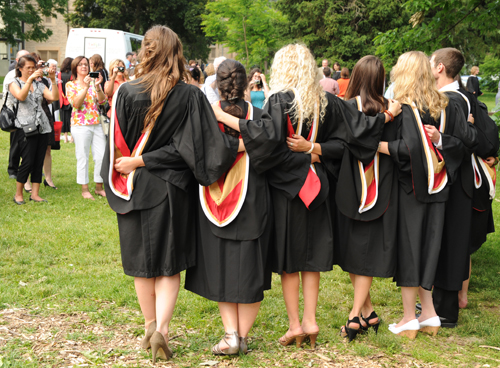This column is part of a series written by Prof. Maureen Mancuso, U of G provost and vice-president academic, for University Affairs magazine, a publication of the Association of Universities and Colleges of Canada. Reprinted with permission.
If there is one virtue that university education values above all else, it is critical thinking. Doubt, not the false security of certainty, is what we seek to instill in our students. We value questions over answers, because only in withstanding the most challenging questions can an answer begin to satisfy the truly critical mind. Oh, we are hardly immune to the paralysis of orthodoxy, but the very essence of scholarship is to relentlessly question what is known, how it is known, and whether there is some further insight to be had by a mind open to what it does not yet know. This is why “revolutions” – disruptive events in the political sphere – are so essential and so frequent in the academic world. Maybe too frequent, and appearing to outsiders as a ferment of undirected, purposeless chaos.
One of the most pernicious illusions that critical thinking can dispel is the “default narrative,” a story full of Colbertian “truthiness” that is repeated so often it displaces actual facts. The default narrative satisfies what some people – especially those with loud, influential voices – wish were true, so much so that whether it actually is true becomes a side issue. History is full of default narratives that have eventually fallen to critical thinking: the heliocentric solar system, the divine right of kings, the “non-person” status of Canadian women, supply-side economics, WMDs in Baghdad, and more.
The default narrative of university education these days, at least as it is related outside academia, is one of hopeless, hapless insufficiency. I don’t mean just the tired cliché of overpaid, ivory- tower eggheads, but also the more pernicious assumption that in the end a university degree is not worth the paper it’s printed on: that graduates waste time, learn no useful skills and end up flipping burgers while struggling to pay off crippling debt. There’s an element of wish fulfillment and fairy-tale comeuppance here: the modern Icarus ends up unemployed and broke for his arrogant pursuit of “higher learning.”
Yes, we all know of people who have achieved success without postsecondary education; society revels in the archetype of the university-dropout CEO (famously Bill Gates, Mark Zuckerberg and Steve Jobs, in a field where the default narrative insists universities are failing to impart economically useful skills). What we forget is that the massive success of those three unique individuals depended on armies of highly educated, degreed employees who turned their CEO’s vision into achievable reality. Just because some dropouts succeed fantastically doesn’t mean that dropping out is a statistically optimal strategy.
An understanding of statistics – a discipline that can lead to counterintuitive but irrefutable conclusions that trump anecdotal “evidence” – is one example of the critical thinking that universities foster, and an answer to the question “Why should I believe A over B, even though B seems ‘truthier?’” Statistics belie the default narrative and contextualize the catchy anecdotes. Some graduates do poorly, others well, but the average graduate is more employable than non-graduates and usually has a higher salary, better health and, in many aspects, improved quality of life.
University graduates vote, volunteer, participate as citizens and create economic and social value disproportionate to their mere numbers and to the amount society invests in their education.
Readers of this magazine hardly need to be convinced of this point, and my purpose is not to trumpet the specific statistics; they are easy to find. Rather, we need to recognize that unless we, who believe in the value of university education, do more to confront and challenge the default narrative, we will suffer ever-declining support and resource retrenchment. Once “everybody knows” that universities are over-funded, it’s a simple deduction to reach a destructive conclusion.
Right now, colleges are speaking with one voice, publicizing their practical, job-oriented approach in old and new media. Universities, on the other hand, are presenting mixed and sometimes competing messages to counter the default narrative. I’m in no way begrudging the colleges’ success; universities just need to stop seeing colleges as competitors instead of complementary collaborators.
We must emphasize that university graduates do gain important skills – because the public dialogue is focused on skills – but we also need to start shifting that dialogue to recognizing the powerful but less-obvious benefits of liberal education. Critical thinking, intellectual curiosity, open-mindedness: these are the drivers of real creativity. Skill alone, without critical thinking, is the expertise of a computer, not of the humans who use computers to serve their minds and change the world.
